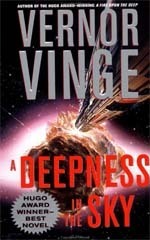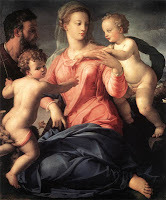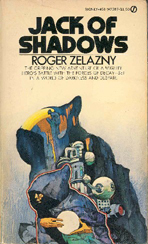Ted Rabinowitz's Blog, page 41
December 20, 2012
Why's That So Good?: Vernor Vinge
 In a blog post I wrote for the gracious and prolific Samantha Combs, I pontificated that the essential fact of science fiction wasn't technology or aliens - it was the effect that speculative possibilities had on the story's characters. The situation, in other words, wasn't as important as how the characters felt about the situation.
In a blog post I wrote for the gracious and prolific Samantha Combs, I pontificated that the essential fact of science fiction wasn't technology or aliens - it was the effect that speculative possibilities had on the story's characters. The situation, in other words, wasn't as important as how the characters felt about the situation.Vernor Vinge - one of the best hard science fiction writers in the last 40 years, and an unacknowledged father of cyberpunk - pulled off this trick twice, in one of SF's most classic tours de force: Not only did he convey a speculative situation's effect on his characters...he made those characters non-human.
In Vinge's A Deepness in the Sky, much of the story takes place on Arachna, an earth-like world with the bad luck to orbit a star that only burns for fifty years out of 250. In the 200-year "Darks" in between, the world grows colder, and colder, and colder...until the atmosphere itself freezes into snow and ice. Some plants and animals simply die out and leave their spores for the next generation; higher life forms, like the intelligent "Spider" race, make use of a form of natural suspended animation in frozen caves.
What makes this life cycle more than a plot device is the thought that Vinge put into the Spiders' attitude toward the Dark. They are just making the leap to a technological civilization and scientific ways of thinking.They regard the Dark with awe as the final, sacred Mystery - almost the way humans today might view Death. So when two of the main Spider characters use technology to stay awake into the Dark and actually walk on the surface of the planet, it isn't just a momentous use of engineering; it is an almost religious, almost blasphemous moment, and the characters half-expect to see the mythical creatures of the Dark that they were told about as children.
Here are a few paragraphs in which Vinge sets out the nature of the Dark. Notice the tone of his narration - quiet, solemn, as though you are being told these facts by a Spider who understands science...but is only a generation removed from superstitious awe:
In the last years of a Waning Sun there are storms, often fierce ones. But these are not the steaming, explosive agony of the storms of a New Sun. The winds and blizzards of the coming Dark are more as though the world is someone mortally stabbed, flailing weakly as life's blood leaks out. For the warmth of the world is its lifeblood, and as that soaks into the Dark, the dying world is less and less able to protest.There comes a time when a hundred stars can be seen in the same sky as the noonday sun. And then a thousand stars, and finally the sun gets no dimmer...and the Dark has truly arrived. The larger plants have long since died, the powder of their spores is hidden deep beneath the snows. The lower animals have passed the same way. Scum mottles the lee of snowbanks, and an occasional glow flows around exposed carcasses: the spirits of the dead, classical observers wrote; a last bacterial scavenging, scientists of later eras discovered.
Yet there are still living people on the surface. Some are the massacred, prevented by stronger tribes (or stronger nations) from entering deep sanctuary. Others are the victims of floods or earthquakes, whose ancestral deepnesses have been destroyed. In olden times, there was only one way to learn what the Dark might really be: stranded topside, you might attain tenuous immortality by writing what you saw and saving the story so securely that it survived the fires of the New Sun. And occasionally one of these topsiders survived more than a year or two into the Dark, either by extraordinary circumstance or by clever planning and the desire to see into the heart of the Dark. One philosopher survived so long that his last scrawl was taken for insanity or metaphor by those who found his words cut into stone above their deepness: "and the dry air is turning to frost."
"And the dry air is turning to frost." Raised the hairs on the back of my neck the first time I read it.
Published on December 20, 2012 19:32
December 19, 2012
People kill people in Chenpeng Village
I know, this isn't nerdy, or geeky, or speculative. But-
On the same day as the Newtown massacre, another miserable lunatic attacked 24 people (all but one of them children) in Chenpeng Village, China.
Now here's the big difference:
He had to do it with a knife, because of China's strict gun-control laws.
And all of the victims are still alive.
Guns don't kill people, people kill people. Sure.
But guns make it a whole goddamned lot easier.
On the same day as the Newtown massacre, another miserable lunatic attacked 24 people (all but one of them children) in Chenpeng Village, China.
Now here's the big difference:
He had to do it with a knife, because of China's strict gun-control laws.
And all of the victims are still alive.
Guns don't kill people, people kill people. Sure.
But guns make it a whole goddamned lot easier.
Published on December 19, 2012 18:13
December 8, 2012
Eye Candy - The Great Bustard
 I love the name.
I love the name.And I love the fact that the bird looks like a bustard.
Seriously, what else would you call it?
Published on December 08, 2012 05:16
December 7, 2012
Available at a Library Near You!
 One of the places that carries TWS is Overdrive, which makes e-books available to public and school libraries around the world. That means that The Wrong Sword is available as an e-book at a library near you. Check it out!
One of the places that carries TWS is Overdrive, which makes e-books available to public and school libraries around the world. That means that The Wrong Sword is available as an e-book at a library near you. Check it out!
Published on December 07, 2012 07:12
December 3, 2012
What We See in the World of Online Dating
I saw this in on a profile recently and thought it was hilarious:
I have a thing for funny guys. If only Louis C.K. was a little sexier, Seth MacFarlane a little more straight, Larry David a little less neurotic, Zach Galifianakis taller.
Yep. "If only Brad Pitt were funny."
I have a thing for funny guys. If only Louis C.K. was a little sexier, Seth MacFarlane a little more straight, Larry David a little less neurotic, Zach Galifianakis taller.
Yep. "If only Brad Pitt were funny."
Published on December 03, 2012 10:03
December 1, 2012
The Better Son?
 I just heard from a creative I knew back in Los Angeles. I congratulated him on the birth of his first kid, and he congratulated me on my own "progeny" - TWS.
I just heard from a creative I knew back in Los Angeles. I congratulated him on the birth of his first kid, and he congratulated me on my own "progeny" - TWS.He's not the first one to use the progeny metaphor for books and other creative projects, of course. But if you think about it, books and children are really converses of each other. It's fun to make a child (or it should be), but after that first moment, it's work, work, work. On the other hand, it's work, work, work to write a book...but it's darned fun if people buy it, read it and like it.
Still, it would be a pretty small life if you mistook art for children, wouldn't it?
Published on December 01, 2012 07:40
November 26, 2012
I Am Lucky
The storage warehouse's basement smells of mold and motor oil. Sand lies in uneven ripples across the cement floor. I brought work gloves with me, but Ray at the counter has a box full of latex gloves and I use those instead. I like my work gloves, and considering the crap that came in with the water when the East River storm surge hit, I might ruin them for good.
I've been keeping a bunch of boxes in storage in Long Island City since I moved back East from Los Angeles. When Sandy hit, the basement flooded; I've only now been able to come back.
I ran down the industrial elevator, and unlocked the unit. I had packed everything in tough blue plastic tubs, about 2 and half feet high, three wide. At first, I think I'm lucky - I crack open a lid and run my penlight on the stuff inside. It's clothing. It's dry. Then I realize that the tubs aren't all safely stacked. Some of them are tilted, askew. I open one. On the top sits a bush hat, a gift from my parents. The hat's snap button has rusted through the fabric. I can smell the mildew. Below that, a Hebrew bible, a prayer book, both mold-eaten mush. I'm not religious anymore, but I was brought up to think of those books as sacred. Now they're rotting. Then paperbacks, favorites, stuff that's hard to find: Harlan Ellison's Watching; Zelazny's Creatures of Light and Darkness, with the original psychedelic 70s cover; John Brunner's The Compleat Traveller in Black; a biography of Sergei Eisenstein that I searched for for years; Eisenstein's Film Form, with the essay that I recommend to every writer; Orwell's Selected Essays.
Then it gets worse. All the notebooks I saved from college. A notebook from grade school, with the Hebrew letters scrawled carefully from right to left. The records I kept of the movie I produced in film school. My clippings from the Columbia Spectator, and the Journal of Commerce and the Business International Money Report; my workbook from the one class at USC that was truly mind-expanding. The tassel from my high school graduation. My past, such as it was.
I'm so much luckier than so many other New Yorkers.
I left it all in a mulched pile next to the door.
I've been keeping a bunch of boxes in storage in Long Island City since I moved back East from Los Angeles. When Sandy hit, the basement flooded; I've only now been able to come back.
I ran down the industrial elevator, and unlocked the unit. I had packed everything in tough blue plastic tubs, about 2 and half feet high, three wide. At first, I think I'm lucky - I crack open a lid and run my penlight on the stuff inside. It's clothing. It's dry. Then I realize that the tubs aren't all safely stacked. Some of them are tilted, askew. I open one. On the top sits a bush hat, a gift from my parents. The hat's snap button has rusted through the fabric. I can smell the mildew. Below that, a Hebrew bible, a prayer book, both mold-eaten mush. I'm not religious anymore, but I was brought up to think of those books as sacred. Now they're rotting. Then paperbacks, favorites, stuff that's hard to find: Harlan Ellison's Watching; Zelazny's Creatures of Light and Darkness, with the original psychedelic 70s cover; John Brunner's The Compleat Traveller in Black; a biography of Sergei Eisenstein that I searched for for years; Eisenstein's Film Form, with the essay that I recommend to every writer; Orwell's Selected Essays.
Then it gets worse. All the notebooks I saved from college. A notebook from grade school, with the Hebrew letters scrawled carefully from right to left. The records I kept of the movie I produced in film school. My clippings from the Columbia Spectator, and the Journal of Commerce and the Business International Money Report; my workbook from the one class at USC that was truly mind-expanding. The tassel from my high school graduation. My past, such as it was.
I'm so much luckier than so many other New Yorkers.
I left it all in a mulched pile next to the door.
Published on November 26, 2012 17:04
November 21, 2012
Why Is That So Good, Part 4 - "REVENGE!"
 I'm kind of on a Roger Zelazny kick right now, so I'll keep going with one of his lesser-known works, Jack of Shadows. I won't go into detail, except to say that the anti-hero, Jack, is a thief who has made a lot of magical enemies, including his mortal foe, the Lord of Bats. Since "darksiders" like Jack and Bats have a knack for returning from the dead, the Lord of Bats has decided to lock up Jack for eternity. After finding a way to escape from the escape-proof prison, Jack pauses in his flight to deliver a little revenge speech. Now, bear in mind that Zelazny held a master's degree in Elizabethan and Jacobean drama - a genre that abounded in bloody tales of revenge. You might say he was a revenge professional.
I'm kind of on a Roger Zelazny kick right now, so I'll keep going with one of his lesser-known works, Jack of Shadows. I won't go into detail, except to say that the anti-hero, Jack, is a thief who has made a lot of magical enemies, including his mortal foe, the Lord of Bats. Since "darksiders" like Jack and Bats have a knack for returning from the dead, the Lord of Bats has decided to lock up Jack for eternity. After finding a way to escape from the escape-proof prison, Jack pauses in his flight to deliver a little revenge speech. Now, bear in mind that Zelazny held a master's degree in Elizabethan and Jacobean drama - a genre that abounded in bloody tales of revenge. You might say he was a revenge professional."You are henceforth and forever an outcast, Jack. Count no darksider as friend."
"I never have."
"I almost was, here, by you. This way, I am able to bid you good-bye."
"I will banish the presence you have summoned and extinguish the fire you have caused. Then I will raise half a world against you. Never again will you know a moment's rest. Your ending will not be a happy one."
"You slew me once, you took my woman and warped her will, you made me your prisoner, wore me around your neck, set your Borshin upon me. Know that when we meet again, I will not be the one who is tortured and bounded into madness. I have a long list, and you head it."
"We will meet again, Shadowjack - perhaps even in a matter of moments. Then you can forget about your list."
"Oh, your mention of lists reminded me of something. Are you not curious as to whose name I effaced when I entered my own into the Book of Ells?"
"What name was it?"
"Strangely enough, it was your name. You should really get out more often, you know. If you had, you would have noticed the chill, inspected the Shield and read in the Book. Then you would have been on Shield duty and I would not have become your prisoner. All of this unpleasantness could have been avoided. There is a moral there somewhere. Get more exercise and fresh air-that may be it."
"In that case, you would have been the Baron's, or back in Glyve."
"A moot point," said Jack, glancing over his shoulder. "That tapestry is going pretty well now, so I can be moving along. In, say - perhaps a season, perhaps less - who knows? - whenever you finish your Shield duty- you will doubtless seek me. Do not be discouraged if you do not succeed at once. Persist. When I am ready, we will meet. I will take Evene back from you. I will take High Dudgeon away from you. I will destroy your bats. I will see you wander from offal to the grave and back again, many times. Goodbye, for now."
I know this works for me.
Does it work for you? And why?
Let me know.
Published on November 21, 2012 13:07
If you like this blog, tell your friends.
If you don't like this blog, tell me.

Published on November 21, 2012 12:47
November 20, 2012
That Bastard, Conrad of Montferrat
 In my research for TWS Book 2, Hero's Army, I keep coming up against this guy Conrad. The crazy thing is, he's actually dead by the time my protagonist Henry arrives in the Holy Land (or, as the Crusaders call it, l'Outremer - the overseas). But he's a really, really interesting case of tainted history.
In my research for TWS Book 2, Hero's Army, I keep coming up against this guy Conrad. The crazy thing is, he's actually dead by the time my protagonist Henry arrives in the Holy Land (or, as the Crusaders call it, l'Outremer - the overseas). But he's a really, really interesting case of tainted history.See, if you read the old chestnuts of English historical fiction like Walter Scott, Conrad's always the baddie. Conniving, evil, wizened, ugly, sadistic, sexually... ahem... experimental... really, they can't find enough nasty things to say about the guy. But if you actually look at the events of his life, you run into some cognitive dissonance.
First of all, he's a hottie. The Byzantine chronicler Niketas Choniates described him as "of beautiful appearance, comely in life's springtime, exceptional and peerless in manly courage and intelligence, and in the flower of his body's strength." (Heck, I'm a straight male, and even I feel a little tingly.)
Third, people really seem to like him. He inspires the Emperor. He unites the Tyrian townspeople. He's elected King of Jerusalem at the end of the Third Crusade. In fact, the only way to get rid of this guy is to kill him.
So somebody does. Hey, this is the Crusades. Everybody dies.
Just a few days after he's elected king, two Assassins bushwhack him and stab him to death. (By the way, these guys weren't just assassins. They were Assassins, with a capital "A". Look it up.)
And this is where things get a little twisted. See, the most likely candidate for the guy who hired the Assassins is none other than Richard I Lionheart. It all fits together - Richard has the means, the motive and the opportunity. He's got money; and he was backing his own nephew, not Conrad, for the throne.
But if you're a British historical writer, you LIKE Richard. (Well, you used to; people are assessing him a tad more critically these days.) So that means you've got to hate Conrad...and there are a lot more English historical novels out there than ones from Montferrat.
Published on November 20, 2012 12:41



